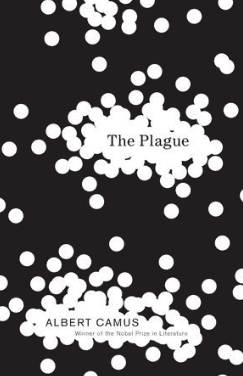Bonnie Salomon
Chicago, Illinois, United States
 |
| Cover of 1991 edition of The Plague by Albert Camus. |
For the past fifteen months, I have been reading and returning to Albert Camus’ 1947 novel, The Plague. Chronicling a fictional plague epidemic in Oran, Algeria, the narrator Dr. Rieux tells the saga of a city’s horrific struggle. When Covid-19 hit American shores in March 2020, scholars and journalists alike rediscovered The Plague, drawing analogies between its depictions of plague with the early days of Covid’s appearance in the United States. I kept the book on my couch, unopened most of the time but standing guard like a sentinel, reminding me of the timeless lessons and sacrifices endured by its characters. It felt like we were living through the novel’s fictional haze, but it was 2020 and our plague was the SARS-COV-2 virus.
Working as an emergency physician, I naturally identified with the beleaguered Dr. Rieux, hoping I could aspire to his selfless—but exhausting—duties caring for the sick and dying during that fictional plague. But now it is spring 2021. Unlike Dr. Rieux, I am vaccinated against this current pestilence. What lessons does The Plague have for us now, at this moment of the Covid-19 pandemic? The novel mirrors our times and eerily describes the ebb and flow of a pandemic. It felt like the right time to return to The Plague, but this time to the last section, when the plague is finally quieting down.
In the novel, much like our own time, the “mortality figures” were decreasing. The townspeople of Oran began to sense that elusive, fragile thing that is hope: “All else took a back seat that daily there were new victims counted for little beside that staggering fact: the weekly total showed a decrease.”
The citizens of Oran dared to talk about life after the plague, while still not fully out of its grip: “It was as if the plague had been hounded down and cornered, and its sudden weakness lent new strength to the blunted weapons used so far against it.” Of course, our weapons—our vaccines—are far from blunt, but they too give a chance to fight back.
As I listen to my patients explaining to me why they would or not would not take the Covid vaccine, I cannot help but remember Dr. Rieux’s observation that “our fellow citizens reactions . . . were diverse to the point of incoherence . . . they fluctuated between high optimism and extreme depression.” While the novel’s majority eagerly celebrated better times, it also makes note of the many that could not fully join in the elation. Dr. Rieux describes the families still suffering from disease, grieving from death, as in a kind of “limbo between joy and grief . . .”
Camus’ fictional plague does come to an end. Its citizens reunite, travel, and begin to live anew. While many readers rediscovered The Plague in March 2020, it would be wise to pick it up again now. The story resonates with every step of our pandemic, and its wisdom continues to guide the moment. Dr. Rieux vows to “bear witness in favor of those plague-stricken people: so that some memorial of the injustice and outrage done them might endure . . .” We have all become witnesses to the Covid-19 pandemic; history will judge us by what kind of testimony we present.
BONNIE SALOMON, MD, is an emergency physician with Northwestern Medicine.

Leave a Reply